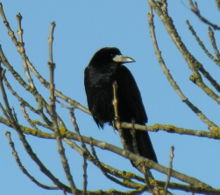rook
English
[edit]Pronunciation
[edit]- IPA(key):/ɹʊk/
- (sometimes in Northern England; otherwise obsolete)IPA(key):/ɹuːk/[1]
- (Scotland,Northern Ireland)IPA(key):/ɹʉk/
Audio(US): (file) - Homophone:ruck(most accentswithout thefoot-strutsplit)
- Rhymes:-ʊk
Etymology 1
[edit]
- InheritedfromMiddle Englishrok,roke,fromOld Englishhrōc,fromProto-West Germanic*hrōk,fromProto-Germanic*hrōkaz(compareOld Norsehrókr,Saterland FrisianRouk,Dutchroek,obsoleteGermanRuch), fromProto-Indo-European*kerk-(“crow, raven”)(compareOld Irishcerc(“hen”),Old Prussiankerko(“loon, diver”),dialectalBulgarianкро́кон(krókon,“raven”),Ancient Greekκόραξ(kórax,“crow”),Old Armenianագռաւ(agṙaw),Avestan𐬐𐬀𐬵𐬭𐬐𐬀𐬙𐬀𐬝(kahrkatat̰,“rooster”),Sanskritकृकर(kṛkara,“rooster”)),Ukrainianкрук(kruk,“raven”).
- (parson):Probably from the resemblance in plumage to a parson's garments.
Noun
[edit]rook(countableanduncountable,pluralrooks)
- A Europeanbird,Corvus frugilegus,of thecrowfamily.
- 1768,Thomas Pennant,British Zoology,page168:
- But what distinguishes therookfrom the crow is the bill; the nostrils, chin, and sides of that and the mouth being in old birds white and bared of feathers, by often thrusting the bill into the ground in search of the erucæ of the Dor-beetle*; the rook then, instead of being proscribed, should be treated as the farmer's friend; as it clears his ground from caterpillars, that do incredible damage by eating the roots of the corn.
- 1850,[Alfred, Lord Tennyson],In Memoriam,London:Edward Moxon,[…],→OCLC,Canto XV,page24:
- To-night the winds begin to rise
And roar from yonder dropping day:
The last red leaf is whirl’d away,
Therooksare blown about the skies; […]
- Acheatorswindler;someone whobetrays.
- Synonyms:seeThesaurus:deceiver,Thesaurus:fraudster
- 7 April1705,William Wycherley, Letter to Alexander Pope inThe Works of Alexander Pope36:
- So I am (like an oldrook,who is ruined by gaming) forced to live on the good fortune of the pushing young men, whose fancies are so vigorous that they ensure their success in their adventures with Muses, by their strength and imagination.
- A bad deal; arip-off.
- (British)A type offirecrackerused by farmers to scare birds of the same name.
- (uncountable)A trick-taking game, usually played with a specialized deck of cards.
- 2007,Malcolm Bull, Keith Lockhart,Seeking a Sanctuary: Seventh-day Adventism and the American Dream,page174:
- Adventists still do not really know how to play cards, apart from the sanitized version of bridge,Rook.
- (slang,archaic)Aparson.
Derived terms
[edit]Translations
[edit]
|
|
|
See also
[edit]Verb
[edit]rook(third-person singular simple presentrooks,present participlerooking,simple past and past participlerooked)
- (transitive)Tocheator swindle.
- 1974,GB Edwards,The Book of Ebenezer Le Page,New York, published2007,page311:
- Some had spent a week in Jersey before coming to Guernsey; and, from what Paddy had heard, they really do know how torookthe visitors over there.
Synonyms
[edit]Hyponyms
[edit]- (cheat):Greek(at cards)
Translations
[edit]
|
Etymology 2
[edit]
InheritedfromMiddle Englishrook,rooke,roke,rok,fromOld Frenchroc,ultimately fromPersianرخ(rox),fromMiddle Persianlhw'(rox,“rook, castle (chess)”).Compareroc.
Noun
[edit]rook(pluralrooks)
- (chess)Apieceshaped like a castletower,that can be moved only up, down, left or right (but notdiagonally) or incastling.
- (rare)Acastleor otherfortification.
Synonyms
[edit]Derived terms
[edit]Translations
[edit]
|
|
- The translations below need to be checked and inserted above into the appropriate translation tables. See instructions atWiktionary:Entry layout § Translations.
See also
[edit]| Chess piecesin English ·chess pieces,chessmen(see also:chess)(layout·text) | |||||
|---|---|---|---|---|---|
| king | queen | rook,castle | bishop | knight | pawn |
Etymology 3
[edit]Fromrookie.
Noun
[edit]rook(pluralrooks)
Etymology 4
[edit]InheritedfromMiddle Englishroke,rock,rok(“mist; vapour; drizzle; smoke; fumes”),fromOld Norse*rauk,related toIcelandicrok,roka(“whirlwind; seafoam; seaspray”),Middle Dutchrooc,rok,ModernDutchrook(“smoke; fog”).
Noun
[edit]rook(uncountable)
Etymology 5
[edit]Verb
[edit]rook(third-person singular simple presentrooks,present participlerooking,simple past and past participlerooked)
- (obsolete)Tosquat;toruck.
- c.1591–1592(date written),William Shakespeare,“The Third Part of Henry the Sixt,[…]”,inMr. William Shakespeares Comedies, Histories, & Tragedies[…](First Folio), London:[…]Isaac Iaggard,andEd[ward]Blount,published1623,→OCLC,[Act V, scene vi]:
- The ravenrook'dher on the chimney's top
Etymology 6
[edit]Verb
[edit]rook(third-person singular simple presentrooks,present participlerooking,simple past and past participlerooked)
- Pronunciation spellingoflook.(mimicking Asian speech)
References
[edit]- ^“Rook”inJohn Walker,A Critical Pronouncing Dictionary[…],London: Sold by G. G. J. andJ. Robinſon,Paternoſter Row; and T.Cadell,in the Strand, 1791,→OCLC,page 439, column 3.
Anagrams
[edit]Afrikaans
[edit]Pronunciation
[edit]Etymology 1
[edit]InheritedfromDutchrook(“smoke”),fromMiddle Dutchrôoc,fromOld Dutch*rōk,fromProto-Germanic*raukiz.
Noun
[edit]rook(uncountable)
Derived terms
[edit]Etymology 2
[edit]InheritedfromDutchroken(“to smoke”).
Verb
[edit]rook(presentrook,present participlerokende,past participlegerook)
- (intransitive,transitive)tosmoke(a tobacco product or surrogate)
Dutch
[edit]Pronunciation
[edit]Etymology 1
[edit]InheritedfromMiddle Dutchrôoc,fromOld Dutch*rōk,fromProto-Germanic*raukiz.
Noun
[edit]rookm(uncountable)
Derived terms
[edit]Descendants
[edit]Etymology 2
[edit]See the etymology of the correspondinglemmaform.
Verb
[edit]rook
- inflection ofroken:
Verb
[edit]rook
Anagrams
[edit]- English 1-syllable words
- English terms with IPA pronunciation
- English terms with audio pronunciation
- English terms with homophones
- Rhymes:English/ʊk
- Rhymes:English/ʊk/1 syllable
- English terms inherited from Middle English
- English terms derived from Middle English
- English terms inherited from Old English
- English terms derived from Old English
- English terms inherited from Proto-West Germanic
- English terms derived from Proto-West Germanic
- English terms inherited from Proto-Germanic
- English terms derived from Proto-Germanic
- English terms derived from Proto-Indo-European
- English lemmas
- English nouns
- English uncountable nouns
- English countable nouns
- English terms with quotations
- British English
- English slang
- English terms with archaic senses
- English verbs
- English transitive verbs
- English terms derived from Old French
- English terms derived from Persian
- English terms derived from Middle Persian
- en:Chess
- English terms with rare senses
- en:Baseball
- English terms derived from Old Norse
- English terms with obsolete senses
- English pronunciation spellings
- en:Corvids
- en:People
- Afrikaans terms with IPA pronunciation
- Afrikaans terms inherited from Dutch
- Afrikaans terms derived from Dutch
- Afrikaans terms inherited from Middle Dutch
- Afrikaans terms derived from Middle Dutch
- Afrikaans terms inherited from Old Dutch
- Afrikaans terms derived from Old Dutch
- Afrikaans terms inherited from Proto-Germanic
- Afrikaans terms derived from Proto-Germanic
- Afrikaans lemmas
- Afrikaans nouns
- Afrikaans uncountable nouns
- Afrikaans verbs
- Afrikaans intransitive verbs
- Afrikaans transitive verbs
- Dutch terms with IPA pronunciation
- Dutch terms with audio pronunciation
- Rhymes:Dutch/oːk
- Rhymes:Dutch/oːk/1 syllable
- Dutch terms inherited from Middle Dutch
- Dutch terms derived from Middle Dutch
- Dutch terms inherited from Old Dutch
- Dutch terms derived from Old Dutch
- Dutch terms inherited from Proto-Germanic
- Dutch terms derived from Proto-Germanic
- Dutch lemmas
- Dutch nouns
- Dutch uncountable nouns
- Dutch masculine nouns
- Dutch non-lemma forms
- Dutch verb forms
